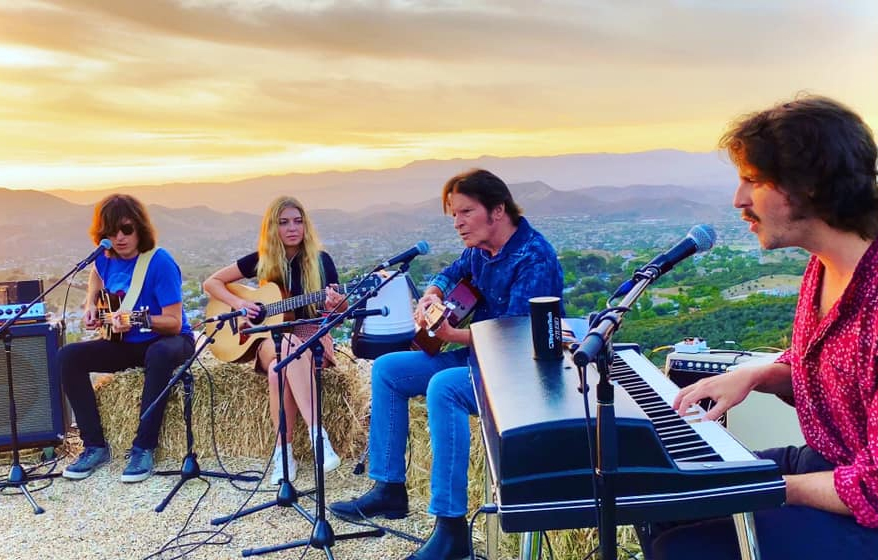Reflections: John Fogerty

A primary voice of Vietnam era prepares to take on an equally unsettling time in American history.
For years, John Fogerty would set his alarm for 4:30 a.m. so that he could quietly practice guitar. His goal was to get in two hours of uninterrupted, but muted, playing before it was time for his real job— waking up his kids, preparing breakfast and, with the help of his wife Julie, getting them ready for school.
“Oh, I’d fuss over them until the cars pulled out of our driveway,” he says now.
These days, the legendary rocker and erstwhile frontman of Creedence Clearwater Revival is no longer primarily concerned with homework. He’s 75 now, and a grandfather. His kids are all grown up. Fogerty’s two sons, Shane and Tyler, have both played in his band, and they have a band of their own—the rising psychrock outfit Hearty Har. He gets up a bit later now—there’s no need to rise before the sun anymore—but he still plays guitar nearly every morning before his double espresso.
During what could be a comfortable retirement, Fogerty is still chugging along—the new protest song he’s recording bites like one of his classics. And, despite being in promo mode, he also makes sure to give some shine to the 2020 social justice movements that pushed him to complete it.
“I’m still on it—these issues still feel personal,” he says. “When the song finally arrived, I could only shake my head and say, ‘We are living this song.’”
The continued relevance of Fogerty’s music does not escape him; he calls it “flabbergasting.” That’s what makes his latest record, Fogerty’s Factory, such a welcome, warm and lovely addition to his nearly 60-year career. It’s a truly multi-generational album—a 12-track collection of reworked hits and covers, mostly cut by Fogerty and his kids at home in Southern California during the COVID-19 summer lockdown.
Fogerty’s first LP in seven years was born in the family’s backyard in the early days of the pandemic, when Julie suggested he offer some comfort to his fans by posting a video of his CCR classic “Have You Ever Seen the Rain?” The newly minted ensemble recorded their acoustic performance outside in the sun, with the family’s golden retriever Creedence in the frame. “They haven’t all been named Creedence, I swear,” Fogerty says with a laugh. Fans lapped up the video, and soon Tyler, Shane and Fogerty’s daughter Kelsey—who was then preparing to leave home for her freshman year of college— joined in.
The quartet began filming stripped-down versions of Fogerty’s most iconic songs—“Fortunate Son,” “Proud Mary,” “Bad Moon Rising”—and releasing them on his Facebook page. Fogerty is an admitted social media novice, but he loved the simple excuse to revisit and reimagine his songs with his kids. (His first TikTok video with his 10-year-old granddaughter is as adorable as one might expect.)
“During a lockdown, what the heck else are you doing? Everyone’s watching old TV, listening to their record collection, teaching the dog new tricks. And so after four or five of these videos, it started to be our routine,” Fogerty says. “And I suddenly realized: We have a family band! It made me crack up. Not in my wildest imagination did I think it would happen.”
Julie remained the Fogerty’s Factory mastermind—or as Fogerty calls her, “my great manifester.” With a notion that this homecooked project could transcend Facebook videos, she assembled all the items to recreate Creedence Clearwater Revival’s iconic Cosmo’s Factory album cover: a chaise lounge, a drum kit, a bicycle, a curtain and the actual amp Fogerty used at Woodstock. Tyler, Shane and Kelsey filled in for John’s CCR bandmates— and Fogerty’s Factory’s cover shot was created before the family members even discussed releasing a record.
With Kelsey preparing to leave home and Shane about to get married, the Fogerty’s Factory lockdown sessions gave the family patriarch his favorite thing on earth: family time.
“My family is the most blessed thing in my life,” he says. “It’s the holy grail, the most valuable thing you could ever seek. Everything else pales in comparison. I met my one and only, and it pushed all the anger and bitterness out of my heart and replaced it with love. We grew our love into a family—that’s my golden ticket.”
And Fogerty admits that playing these iconic, Vietnamera songs with his kids—whose generation launched its own protest movement this spring after the murder of George Floyd—also reignited his passion for protest music.
“I learned at the knee of people like Bob Dylan, who was speaking about racial inequality and civil rights early on,” Fogerty says. “We know that music can make you dance and feel good—but, hopefully, your songs mean enough that people start to think about the other guy, not just themselves. I’m not talking about propaganda. Protest music asks people to question the world. And, hopefully, people come to the correct conclusion about our place on this planet: We must treat people the way we want to be treated ourselves.”
Inspired by the Black Lives Matter movement, Fogerty is as much a musical activist today as when he wrote “Fortunate Son.” He even joined Kelsey at a few recent protests in Los Angeles.
“For me and millions and millions of other white people, we’ve always been in favor of equality and civil rights. But we haven’t done the work to figure out what that means,” he says. “Minority communities can’t fight this fight by themselves. They need us all to stand together. And that’s exactly what we’re doing now.”



















